Tales of fear from Taliban-held Kunduz
- Published
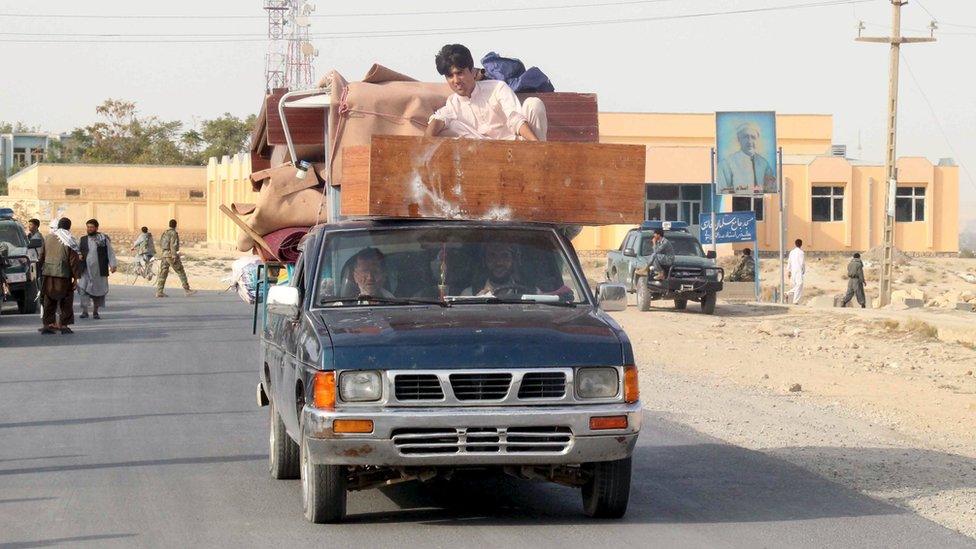
Some residents have fled parts of the city as the fighting raged
Residents of the northern Afghan city of Kunduz have been trapped since Taliban fighters captured the city on Monday. Fighting has been raging since, as troops and police, backed by Nato special forces and air power, try to take the city back.
Here some of those who have escaped the violence, and others who have not, describe their experiences.
Mohammad Yaqoub, 28, university student, Imam Sahib district, north of Kunduz - 'No-one can sleep'
There has been fighting for the past couple of days but it intensified this afternoon (30 September) and then it died down. Late this afternoon all the officials in our district - the police chief, the district chief, and everyone else - left for Sherkhan Bandar, on the border with Tajikistan.
The security forces left without firing a single bullet. About 15 minutes later, the Taliban arrived and raised their flag over the police headquarters and the district chief's office.
The shops are all closed now. The bazaar is shut and no-one dares to come out on the streets. No-one can sleep. The Taliban are patrolling the district on foot and on motorbikes and everyone is waiting to see what is going to happen next. The local Taliban know us but we are scared of the foreign fighters who are with them.
Mohammad Pooya, 37, businessman (left the city) - 'Many people have been trying to leave'
The initial assault on the city was very quick. The Taliban appeared with rocket launchers and AK-47s and the Afghan security forces just melted away. By daybreak the Taliban were in already in the city centre.
They had megaphones and were calling on people to open up their shops and get on with normal life. They were promising not to harm anyone. At first some people did come out to find out what was going on. But pretty soon everyone went back home and few people have dared to venture out since.
There's been intense fighting going on. Shops and businesses and the city bazaars are all closed. Some families are already running short of food. People who have kitchens outside in their yards are too scared to go and cook because of the shooting. I myself moved to a relative's house because I felt safer with lots of family around.
The youngest children couldn't sleep all night and even the one-year-old who can hardly talk said to me: "Again, war?"
The Taliban have started searching the houses of anyone they suspected of working for the government or being a member of the Afghan security forces. They've been taking everything they can carry from the houses and setting fire to the rest. They've also seized all the government cars. They are stopping and searching any young single young men on the streets so it's particularly dangerous for them.
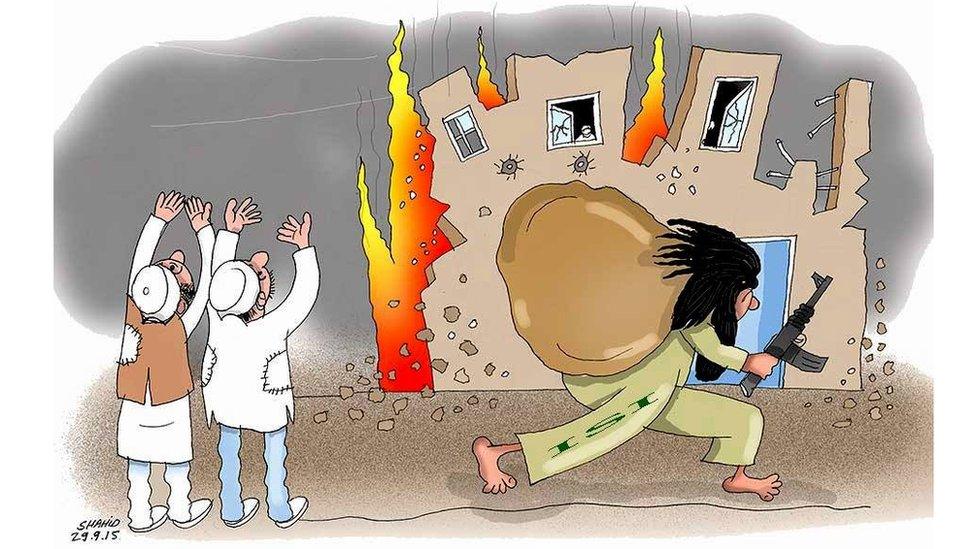
Cartoonist Shahid Atiqullah has captured the violence and looting that has gone on in Kunduz
Many people have been trying to leave the city. I managed to get to the main taxi rank early this morning (30 September). I had to go through the side streets to avoid the crossfire. There were hardly any cars, and the drivers who were there were charging more than five times the normal fare to take us to Takhar, the next-door province.
The drivers say they're risking their lives and they're also worried the Taliban will confiscate their vehicles. It made me really sad to see so many families with children leaving the city. People were so scared and many of them were crying.
Many were on foot and trying to get to the nearest villages to get away from the fighting.

Read more on the battle for Kunduz
The significance of Kunduz lies in its strategic location at the centre of drug-smuggling routes
Taliban overrun Kunduz Images of how the Taliban suddenly overwhelmed the city
Mullah Mansour's battle to be Taliban leader After all the disagreements, the Taliban says it has rallied around its new leader
Who are the Taliban? A guide to the complexities and conflicts within the militant group

Doctor, 45, Kunduz hospital - 'A lot of people have gunshot wounds'
We have a big hospital here with 200 beds, but there are so many injured people coming in that we can barely cope. We've got patients in the corridors because we've run out of beds.
We are seeing a lot people with gunshot wounds and recently we've had some with shrapnel injuries - that was after Afghan army helicopters started bombing Taliban targets.
The Taliban aren't allowing any of the doctors to leave the hospital. They've told us they will protect us but we have to keep on working.
The women doctors are all here too. Some of my colleagues haven't been home for more than 48 hours now.
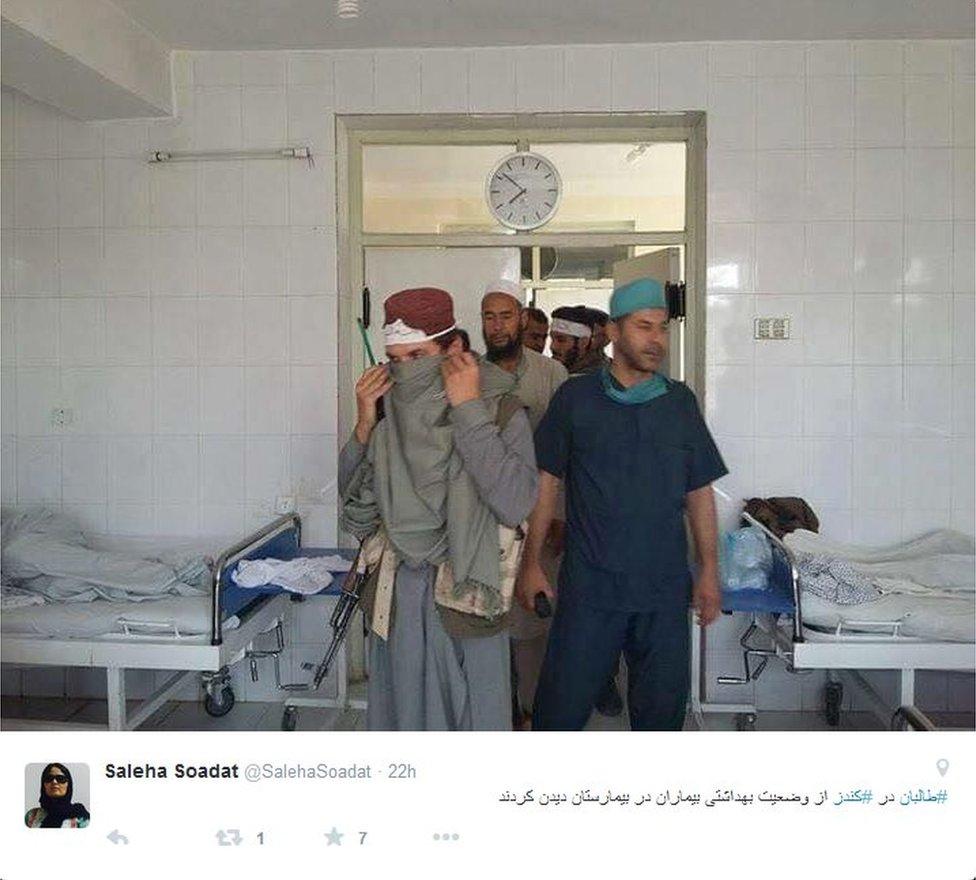
Tolo News reporter Saleha Soadat documented the invasion of a hospital by Taliban fighters.
Ayoub Khan, 40, shopkeeper (left the city) - 'Our children were so scared'
I left this morning (30 September). There was fighting going on and the roads were blocked. Lots of people were trying to get out of the city and go either to Khanabad district, which is still held by the government, or to Takhar, the neighbouring province.
We could hear helicopters roaring overhead hitting targets in the city. Everyone was expecting a government offensive and so they were trying to get out before the fighting intensified.
Our children were so scared of the fighting and the sound of gunfire. We saw Taliban on motorbikes and in cars driving around the city. It was not a normal situation at all.
At the taxi rank whenever a car appeared people were rushing towards it. Those who had private cars were leaving on their own.
But there were so many people waiting for a lift. There were Taliban checkpoints on the outskirts of the city. They stopped us and asked us where we were going. I said we were going to Khanabad and they let us go.
They didn't say much. When you have women and children with you, they leave you alone.
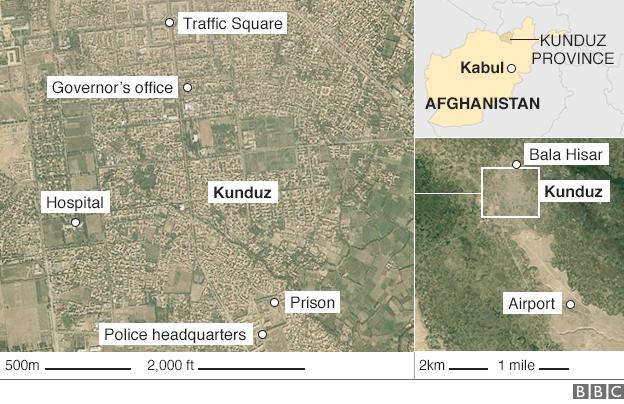
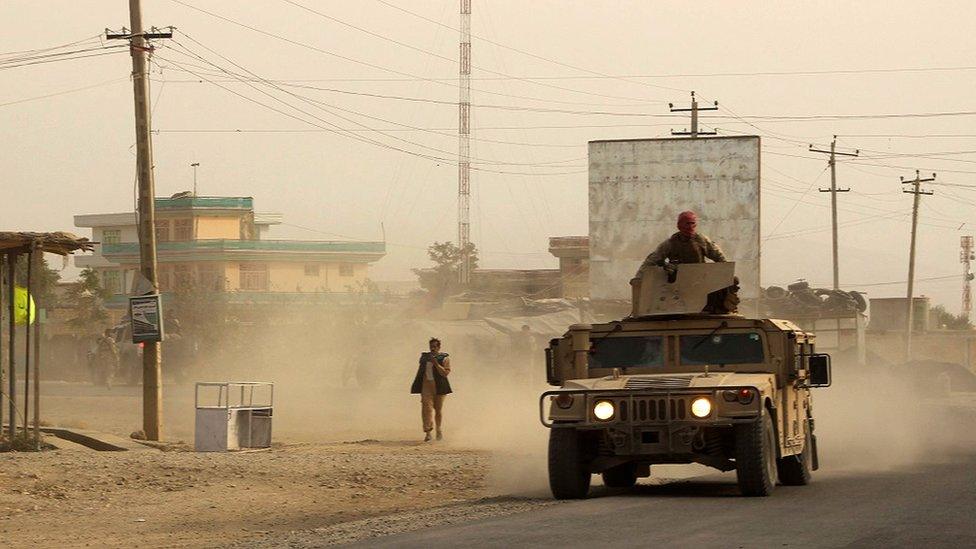
The government says its forces in Kunduz are being reinforced
Interviews conducted by the BBC's Daud Qarizadah and BBC Afghan service colleagues. Names have been changed.

Are you in Kunduz? Have you been affected by the violence in Afghanistan? Let us know about your experiences. Email haveyoursay@bbc.co.uk, external with your stories.
Please include a contact number if you are willing to speak to a BBC journalist. You can also contact us in the following ways:
WhatsApp: +44 7525 900971
Send pictures/video to yourpics@bbc.co.uk, external
Tweet: @BBC_HaveYourSay, external
Send an SMS or MMS to 61124 or +44 7624 800 100